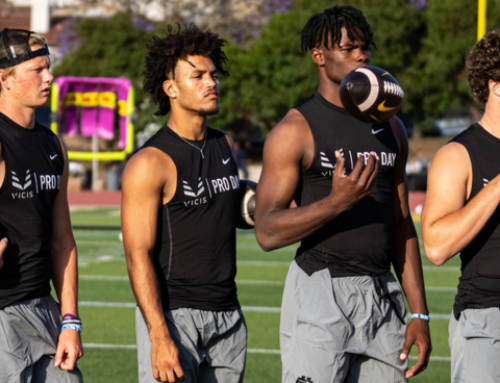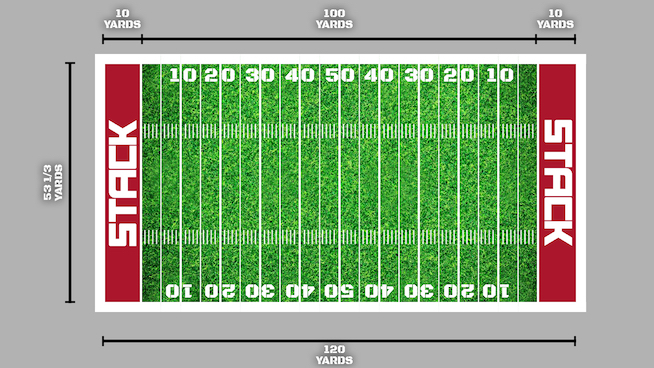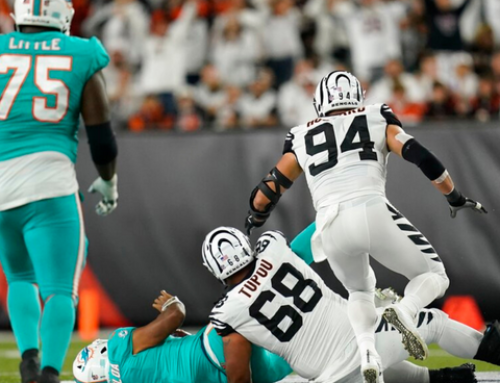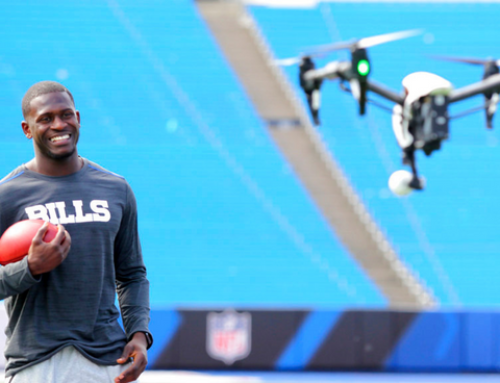Derrick Baity Jr. Once Thought Going to College Was Impossible. Now He’s Headed to the NFL
Derrick Baity Jr.’s body tells a story.
To NFL scouts, that story is potential lockdown cornerback. Baity’s 6-foot-2 frame gives him a bullying presence at the position, and his 38.5-inch vertical leap is tailor-made to disrupt jump balls. But a look beyond the measurables reveals a greater tale, as Baity’s inked arms, legs and torso trace an improbable path to the pros. “I just don’t have tattoos. My tattoos tell a story,” Baity says.
That story is very much rooted in west Tampa. Nods to the city are tattooed all over his body, from the 813 area code on his right wrist to the Tampa Bay Rays logo on his right shoulder. The words “Oak Village,” the name of the housing project he once lived in, adorn his left forearm, while “Amazin,” the name of his childhood street, streaks down his right calf.
Baity’s mother, Tasha Moore, was a single parent who raised him with the help of his grandmothers. She nudged her son toward sports as a way to keep him off the streets. “Our circumstances were either you were playing sports or you were a troubled kid. So she always pushed sports,” Baity says.
Baity struggled with asthma as a kid, but that couldn’t keep him from playing. “I used to play running back, so I would score a touchdown and just pass out. Like I’d run 99 yards and pass out in the end zone,” Baity says. He eventually grew out of it, and picked up boxing and basketball, as well.
“I boxed from like 7th to 11th grade, getting my hand-eye coordination and conditioning up,” Baity says. “In football, you gotta be physical, and playing corner, you’ve gotta use your hands and your feet. So boxing definitely helped me.” By the time he enrolled at H.B. Plant High School, he was showing tremendous promise as a football player. But despite the fact he was a rising star at a school with a pedigree for producing NFL talent, his expectations were anchored by his environment.

“I didn’t think (playing in college) was in the cards for me just because where I come from—it wasn’t natural for a kid out of our environment to go to college. I didn’t really think I was going to college,” Baity says. “My main goal was I just wanted to graduate high school.”
Baity spent a lot of time hanging out on the corner of a west Tampa intersection he calls the “four way.” He’s commemorated the place with a tattoo on the back of his left hand—a stop sign emblazoned with a large red “4.” Many of the people he saw come through the four way had been hanging around the neighborhood their entire lives, and odds are, they’d be there forever. Even those who tried to escape often found themselves pulled back, like the intersection had its own inescapable gravity. Baity grew up submitted to the idea he’d likely live and die there. “That’s where I come from. I come from the projects. I’m a food stamp kid,” Baity says. “I struggled, my mom struggled, family struggled.”
But as Baity’s work ethic evolved, so did his expectations. He was beanpole skinny in high school, but he was a smooth athlete with a relentless work ethic. “I would take drills on the field to heart. I had to perfect the drill on the field,” Baity says. “I just did the W-Drill (constantly).” The summer ahead of his junior year, Baity earned an offer from the University of South Florida.
By Baity’s senior year, he was one of Tampa’s best high school players. That season, he tallied 66 tackles and six interceptions (three of which were pick-sixes) en route to first-team All-State defense honors. The 730 yards and 12 touchdowns he racked up at receiver only solidified his standing as an elite recruit. Soon enough, his offer list also included schools like Wisconsin, Virginia and Louisville. But ultimately, the decision came down to USF or Kentucky. The allure of the SEC was major, no doubt. But his choice ultimately came down to a different factor. To be his best self, he had to escape some of the bad influences in his hometown.
“I ain’t really wanna leave home. But I had to make a grown-up decision. I couldn’t stay in Tampa. If I was to stay in Tampa, I was gonna be a troubled kid, one of the athletes you read about who made a bad decision and my career is over,” Baity says. “That’s why I chose UK.”
Baity made an immediate impact in Lexington, playing in all 12 games his freshman season. To build off the encouraging start, he had to get stronger—and fast. Baity was still painfully skinny, and his weight room strength left a lot to be desired. He remembers tackling Dak Prescott in his first collegiate start, only for the future Dallas Cowboys signal-caller to call him “little man.”
“I feel like Hercules compared to (when I came in). I came in probably like 170. I remember I couldn’t’ even do 135 on the bench. And that’s a warm-up for the average Joe, you know?” Baity says.
Baity requested extra sessions with the team’s strength and conditioning coach to help him close the gap between himself and his opponents. The two met for private workouts roughly three times a week on top of the team’s existing sessions, and the results came soon enough. Nowadays, Baity weighs close to 200 pounds, and his bench press max is pushing 300.

“I just always wanted to be the best, especially at my position. I used to always get in the film room, always go to my coaches, (ask) what can I do to improve? And just work on those things,” Baity says. Away from football, Baity also found a new outlet—painting. The inspiration came from an older cousin who suggested he find a productive hobby to help him relieve stress while in college.
“He was just like ‘try to find something you like, you like to draw or anything?’ I was like, ‘I like painting.’ I turn on some music, some nice music, R&B, hip hop, whatever, and just paint away,” Baity says. “I just paint what I feel or what I go through.”
Baity had a breakout sophomore campaign, starting every game for the Wildcats and tying for the team lead in interceptions (three) while finishing second in pass break-ups (seven). He was a critical cog on a defense that helped UK to their first wining season since 2009. The following offseason, his life changed forever when his son, Derrick Baity III, was born. While the experience of being a new dad was a blessing, the first few months took a physical and mental toll. Baity admits his junior season was more inconsistent than he would’ve liked.
With his final college season looming, he sat down for a meeting with UK defensive backs coach Steven Clinkscale. Clinkscale kicked things off with a simple-yet-powerful question—”How do you want to be remembered?”
“He was like what do you want your legacy to be? I was like I want to be known as a great person and a great player. (He says) well, statistically, this is what it’s looking like. You had your great sophomore season, then you took a step back your junior season. That’s inconsistent. So how are we gonna help you during your senior season?,” Baity recalls. “We came up with some little solutions. Let’s not talk after you break up a pass. Let’s get ready and go for the next play, act like you’ve been there before. So I stopped talking so much during practice as far as talking trash. I ain’t never really talk (too much) trash before, but it was (about) getting ready, focus on the next play.”

A locked-in Baity was lockdown for the Wildcats during their historic 2018 season. He totaled 38 tackles plus a team-high seven pass break-ups, and allowed just 22 catches for 196 yards and a touchdown on the season. Thanks in large part to Baity, UK’s stingy defense conceded just 16.8 points per game, sixth-fewest in the nation. The Wildcats won 10 games for the first time in 41 years, and they also snapped one of the most infamous streaks in college football.
“It was the longest losing streak in college football. Kentucky losing to Florida. We lost to them 31 straight years. Then (we) had to beat them in Florida. You know how hard it is to go beat Florida in the Swamp?” Baity says. “I remember how we started on defense. They tried to come at me first play of the game. They threw a bomb. Incomplete. Then from there, it was lights out.”
Just like that, a kid who once couldn’t imagine himself going to college had built himself into a legitimate NFL Draft prospect. Since the birth of his son, he’s also welcomed a daughter, Trinity, into his life. Those who raised him and those he’s now raising himself are everything to him, and his body is a breathing tribute to his kin. Across his right side, he has a tattoo of his mother’s name. On the opposite half, a portrait of his son. On his back, a silhouette of him holding hands with his daughter and two nieces. Above the “lone wolf” that represents himself on the back of his right hand are the names of his grandmothers, and on the right half of his abdomen, the words “Family is My Strength.”

“My kids, I feel like if I’m going to teaching them anything in life, it’s (to) never give up,” Baity says. “Don’t be what society told you to be. Don’t be that statistic.”
Before every game at Kentucky, Baity would step onto the field to soak in the atmosphere. He’d take a deep breath, then a long, slow lap around the stadium. It was his moment to smell the roses—to appreciate the fact a kid from the four way had blossomed into this. And on the precipice of achieving a dream he never imagined possible, there’s more to be written.
“I cried many nights (growing up). I didn’t know what was going to happen. I talked to people, I opened up,” Baity says. “Be whatever you want to be. It don’t matter the circumstances. Try your best to keep going, keep going forward.”
Photo Credit: Icon Sportswire/Getty Images
RECOMMENDED FOR YOU
MOST POPULAR
Derrick Baity Jr. Once Thought Going to College Was Impossible. Now He’s Headed to the NFL
Derrick Baity Jr.’s body tells a story.
To NFL scouts, that story is potential lockdown cornerback. Baity’s 6-foot-2 frame gives him a bullying presence at the position, and his 38.5-inch vertical leap is tailor-made to disrupt jump balls. But a look beyond the measurables reveals a greater tale, as Baity’s inked arms, legs and torso trace an improbable path to the pros. “I just don’t have tattoos. My tattoos tell a story,” Baity says.
That story is very much rooted in west Tampa. Nods to the city are tattooed all over his body, from the 813 area code on his right wrist to the Tampa Bay Rays logo on his right shoulder. The words “Oak Village,” the name of the housing project he once lived in, adorn his left forearm, while “Amazin,” the name of his childhood street, streaks down his right calf.
Baity’s mother, Tasha Moore, was a single parent who raised him with the help of his grandmothers. She nudged her son toward sports as a way to keep him off the streets. “Our circumstances were either you were playing sports or you were a troubled kid. So she always pushed sports,” Baity says.
Baity struggled with asthma as a kid, but that couldn’t keep him from playing. “I used to play running back, so I would score a touchdown and just pass out. Like I’d run 99 yards and pass out in the end zone,” Baity says. He eventually grew out of it, and picked up boxing and basketball, as well.
“I boxed from like 7th to 11th grade, getting my hand-eye coordination and conditioning up,” Baity says. “In football, you gotta be physical, and playing corner, you’ve gotta use your hands and your feet. So boxing definitely helped me.” By the time he enrolled at H.B. Plant High School, he was showing tremendous promise as a football player. But despite the fact he was a rising star at a school with a pedigree for producing NFL talent, his expectations were anchored by his environment.

“I didn’t think (playing in college) was in the cards for me just because where I come from—it wasn’t natural for a kid out of our environment to go to college. I didn’t really think I was going to college,” Baity says. “My main goal was I just wanted to graduate high school.”
Baity spent a lot of time hanging out on the corner of a west Tampa intersection he calls the “four way.” He’s commemorated the place with a tattoo on the back of his left hand—a stop sign emblazoned with a large red “4.” Many of the people he saw come through the four way had been hanging around the neighborhood their entire lives, and odds are, they’d be there forever. Even those who tried to escape often found themselves pulled back, like the intersection had its own inescapable gravity. Baity grew up submitted to the idea he’d likely live and die there. “That’s where I come from. I come from the projects. I’m a food stamp kid,” Baity says. “I struggled, my mom struggled, family struggled.”
But as Baity’s work ethic evolved, so did his expectations. He was beanpole skinny in high school, but he was a smooth athlete with a relentless work ethic. “I would take drills on the field to heart. I had to perfect the drill on the field,” Baity says. “I just did the W-Drill (constantly).” The summer ahead of his junior year, Baity earned an offer from the University of South Florida.
By Baity’s senior year, he was one of Tampa’s best high school players. That season, he tallied 66 tackles and six interceptions (three of which were pick-sixes) en route to first-team All-State defense honors. The 730 yards and 12 touchdowns he racked up at receiver only solidified his standing as an elite recruit. Soon enough, his offer list also included schools like Wisconsin, Virginia and Louisville. But ultimately, the decision came down to USF or Kentucky. The allure of the SEC was major, no doubt. But his choice ultimately came down to a different factor. To be his best self, he had to escape some of the bad influences in his hometown.
“I ain’t really wanna leave home. But I had to make a grown-up decision. I couldn’t stay in Tampa. If I was to stay in Tampa, I was gonna be a troubled kid, one of the athletes you read about who made a bad decision and my career is over,” Baity says. “That’s why I chose UK.”
Baity made an immediate impact in Lexington, playing in all 12 games his freshman season. To build off the encouraging start, he had to get stronger—and fast. Baity was still painfully skinny, and his weight room strength left a lot to be desired. He remembers tackling Dak Prescott in his first collegiate start, only for the future Dallas Cowboys signal-caller to call him “little man.”
“I feel like Hercules compared to (when I came in). I came in probably like 170. I remember I couldn’t’ even do 135 on the bench. And that’s a warm-up for the average Joe, you know?” Baity says.
Baity requested extra sessions with the team’s strength and conditioning coach to help him close the gap between himself and his opponents. The two met for private workouts roughly three times a week on top of the team’s existing sessions, and the results came soon enough. Nowadays, Baity weighs close to 200 pounds, and his bench press max is pushing 300.

“I just always wanted to be the best, especially at my position. I used to always get in the film room, always go to my coaches, (ask) what can I do to improve? And just work on those things,” Baity says. Away from football, Baity also found a new outlet—painting. The inspiration came from an older cousin who suggested he find a productive hobby to help him relieve stress while in college.
“He was just like ‘try to find something you like, you like to draw or anything?’ I was like, ‘I like painting.’ I turn on some music, some nice music, R&B, hip hop, whatever, and just paint away,” Baity says. “I just paint what I feel or what I go through.”
Baity had a breakout sophomore campaign, starting every game for the Wildcats and tying for the team lead in interceptions (three) while finishing second in pass break-ups (seven). He was a critical cog on a defense that helped UK to their first wining season since 2009. The following offseason, his life changed forever when his son, Derrick Baity III, was born. While the experience of being a new dad was a blessing, the first few months took a physical and mental toll. Baity admits his junior season was more inconsistent than he would’ve liked.
With his final college season looming, he sat down for a meeting with UK defensive backs coach Steven Clinkscale. Clinkscale kicked things off with a simple-yet-powerful question—”How do you want to be remembered?”
“He was like what do you want your legacy to be? I was like I want to be known as a great person and a great player. (He says) well, statistically, this is what it’s looking like. You had your great sophomore season, then you took a step back your junior season. That’s inconsistent. So how are we gonna help you during your senior season?,” Baity recalls. “We came up with some little solutions. Let’s not talk after you break up a pass. Let’s get ready and go for the next play, act like you’ve been there before. So I stopped talking so much during practice as far as talking trash. I ain’t never really talk (too much) trash before, but it was (about) getting ready, focus on the next play.”

A locked-in Baity was lockdown for the Wildcats during their historic 2018 season. He totaled 38 tackles plus a team-high seven pass break-ups, and allowed just 22 catches for 196 yards and a touchdown on the season. Thanks in large part to Baity, UK’s stingy defense conceded just 16.8 points per game, sixth-fewest in the nation. The Wildcats won 10 games for the first time in 41 years, and they also snapped one of the most infamous streaks in college football.
“It was the longest losing streak in college football. Kentucky losing to Florida. We lost to them 31 straight years. Then (we) had to beat them in Florida. You know how hard it is to go beat Florida in the Swamp?” Baity says. “I remember how we started on defense. They tried to come at me first play of the game. They threw a bomb. Incomplete. Then from there, it was lights out.”
Just like that, a kid who once couldn’t imagine himself going to college had built himself into a legitimate NFL Draft prospect. Since the birth of his son, he’s also welcomed a daughter, Trinity, into his life. Those who raised him and those he’s now raising himself are everything to him, and his body is a breathing tribute to his kin. Across his right side, he has a tattoo of his mother’s name. On the opposite half, a portrait of his son. On his back, a silhouette of him holding hands with his daughter and two nieces. Above the “lone wolf” that represents himself on the back of his right hand are the names of his grandmothers, and on the right half of his abdomen, the words “Family is My Strength.”

“My kids, I feel like if I’m going to teaching them anything in life, it’s (to) never give up,” Baity says. “Don’t be what society told you to be. Don’t be that statistic.”
Before every game at Kentucky, Baity would step onto the field to soak in the atmosphere. He’d take a deep breath, then a long, slow lap around the stadium. It was his moment to smell the roses—to appreciate the fact a kid from the four way had blossomed into this. And on the precipice of achieving a dream he never imagined possible, there’s more to be written.
“I cried many nights (growing up). I didn’t know what was going to happen. I talked to people, I opened up,” Baity says. “Be whatever you want to be. It don’t matter the circumstances. Try your best to keep going, keep going forward.”
Photo Credit: Icon Sportswire/Getty Images











